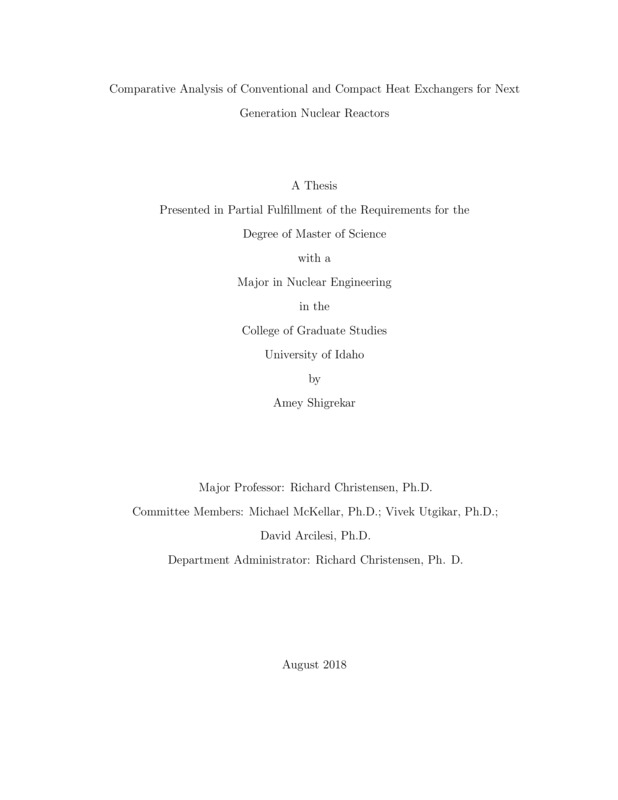Comparative Analysis of Conventional and Compact Heat Exchangers for Next Generation Nuclear Reactors
Shigrekar, Amey. (2018-08). Comparative Analysis of Conventional and Compact Heat Exchangers for Next Generation Nuclear Reactors. Theses and Dissertations Collection, University of Idaho Library Digital Collections. https://www.lib.uidaho.edu/digital/etd/items/shigrekar_idaho_0089n_11426.html
- Title:
- Comparative Analysis of Conventional and Compact Heat Exchangers for Next Generation Nuclear Reactors
- Author:
- Shigrekar, Amey
- Date:
- 2018-08
- Program:
- Nuclear Engineering
- Subject Category:
- Engineering
- Abstract:
-
Advanced reactor concepts such as the Generation IV rectors were designed with the intent to achieve longer operational life cycles, a sufficiently high degree of safety, and a competitive economic edge over their fossil fuel-based energy producing counterparts. The design features of these reactors include higher fuel burn-ups, broader range of acceptable fuels, and high reactor coolant outlet temperatures. In order to utilize the heat produced by these reactors more efficiently, it is envisioned to couple them with various industrial process heat applications. However, transferring heat from the cores of these high temperature reactors requires high integrity heat exchangers (HXs) which can perform under severe conditions with high effectivenesses. Compact HXs have gained recent attraction due to their superior performance at high temperatures and pressures, as well as their capability to meet the needs of the myriad of industrial applications. This thesis primarily focuses on the comparison of such highly efficient compact HXs with the current industry standard conventional HXs, by gauging their thermal performance and economic benefits, to provide a stronger case for their large scale development and deployment.
In this study, two compact HXs, namely the printed circuit heat exchangers (PCHEs) with straight and zigzag channels, have been compared to a conventional tube-in-tube helical coil heat exchanger (HCHE). Various fluid sets with specific operating conditions were chosen to perform a design analysis, in order to acquire metrics for characterizing the thermal performances of the HXs, which was then followed by a simplistic cost analysis. MATLAB was used, to optimize the HX designs by iteratively solving the geometry-specific thermal hydraulic correlations, until the boundary conditions were met. Using the operating conditions for each fluid set, the assumptions made to simplify the analyses, and the applied design constraints, optimum HX designs were acquired.
- Description:
- masters, M.S., Nuclear Engineering -- University of Idaho - College of Graduate Studies, 2018-08
- Major Professor:
- Christensen, Richard
- Committee:
- McKellar, Michael; Utgikar, Vivek; Arcilesi, David
- Defense Date:
- 2018-08
- Identifier:
- Shigrekar_idaho_0089N_11426
- Type:
- Text
- Format Original:
- Format:
- application/pdf
- Rights:
- In Copyright - Educational Use Permitted. For more information, please contact University of Idaho Library Special Collections and Archives Department at libspec@uidaho.edu.
- Standardized Rights:
- http://rightsstatements.org/vocab/InC-EDU/1.0/

